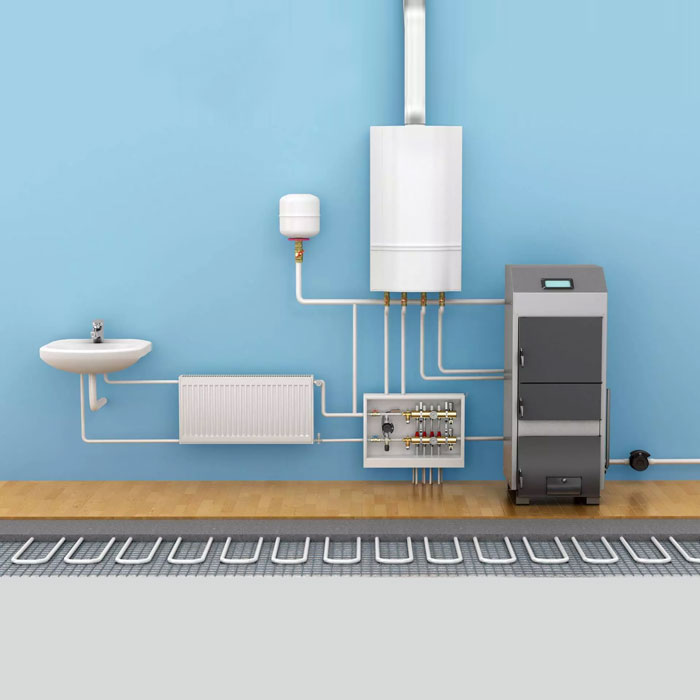
When it comes time to select a home heating system, homeowners face an important decision that can impact their comfort, finances, and carbon footprint. The three most common options for whole-home heating are oil, natural gas, and electric systems. Each has its own set of pros and cons to weigh. This article provides an overview of how these three heating systems work, as well as pros and cons for each system.
Oil Heat
Oil heating systems, also known as fossil fuel systems, utilize an oil-fueled boiler or furnace to heat water or air which is then circulated throughout the home via radiators, baseboards, or ductwork. The boiler heats the water or air when a thermostat signals more heat is needed. Oil is delivered by truck and stored in an outdoor tank or basement tank. As the oil is used, the tank level goes down and needs periodic refilling. Oil heating provides full home heating, plus may provide domestic hot water if a hot water coil is installed in the boiler.
Oil heating systems have been warming homes for decades, and they continue to be a popular choice for many homeowners. Let's dive into the pros and cons of oil heating.
Pros of Oil Heating
Reliable Heat: Oil heating systems are known for their reliability. They can provide a steady and consistent source of heat, even in the coldest of winters.
High Energy Efficiency: Modern oil furnaces have come a long way in terms of energy efficiency. They can convert a high percentage of the fuel into usable heat, making them cost-effective in the long run.
Energy Independence: Unlike natural gas, which relies on pipelines, oil is stored on-site in a tank. This provides homeowners with a sense of energy independence and control over their fuel supply.
Long Lifespan: Well-maintained oil heating systems can last for decades, which can result in significant cost savings over time.
Quiet Operation: Oil heating systems tend to operate quietly, ensuring that you can enjoy a peaceful and cozy atmosphere in your home.
Cons of Oil Heating
Environmental Concerns: Oil heating systems produce carbon emissions, making them less environmentally friendly than some alternatives. The environmental impact can be mitigated by using biofuels, but this may come at a higher cost.
Fuel Storage: Storing oil on-site can be a logistical challenge. It requires space for a tank, and you must ensure that the tank is properly maintained to prevent leaks.
Fuel Price Fluctuations: The cost of heating oil can be subject to significant fluctuations, which can make it challenging to budget for heating expenses.
Natural Gas Heat
Natural gas heating utilizes gas-fired furnaces or boilers to heat air or water to provide home heating. The gas is piped directly into the home from underground gas utility lines. Natural gas heating systems provide both full home heating and domestic hot water in most cases. Gas furnaces heat air which is blown through ducts to warm the home. Gas boilers heat water which circulates through radiators or baseboards. Natural gas heating is activated by thermostats, with the furnace or boiler turning on as needed.
Natural gas heating systems have gained popularity due to their convenience and efficiency. Let's explore the pros and cons of gas heating.
Pros of Gas Heating
Cost-Effective: Natural gas is often more affordable than oil or electricity, making it an attractive option for budget-conscious homeowners.
Cleaner Burning: Gas heating systems produce fewer carbon emissions compared to oil systems, making them a relatively eco-friendly choice.
Instant Heat: Gas heating systems provide instant heat, making it easy to warm up your home quickly.
Low Maintenance: Gas furnaces typically require less maintenance than oil systems, which can translate to cost savings over time.
Cons of Gas Heating
Dependence on Infrastructure: Gas heating relies on a pipeline infrastructure, so availability can be limited in certain areas. This means that not all homes have access to natural gas.
Fluctuating Gas Prices: Like oil, the cost of natural gas can fluctuate, which may impact your heating expenses.
Safety Concerns: Natural gas is highly flammable, and gas leaks can be dangerous. Proper installation and maintenance are essential to ensure safety.
Electric Heat
Electric home heating utilizes electric resistance or heat pumps to produce heat. Electric resistance heating uses coils that heat up when electrical current passes through them. Heat pumps move heat between indoor and outdoor coils to heat or cool a home. Electric systems employ central forced-air furnaces, radiant floor heating, baseboard heaters, or wall-mounted radiators controlled by a thermostat. Heat pumps can provide both home heating and cooling in one system. Electricity must be wired to the home to utilize these heating options.
Electric heating systems have evolved over the years and have gained popularity for their cleanliness and versatility. Let's delve into the pros and cons of electric heating.
Pros of Electric Heating
Clean Energy: Electric heating produces zero emissions at the point of use, making it an environmentally friendly option. If your electricity comes from renewable sources, it can be a very green choice.
Ease of Installation: Electric heaters are easy to install and can be used in various settings, including individual room heaters and central heating systems.
Safety: Electric heating systems are generally considered safe because they do not involve combustible fuels.
Zoned Heating: Electric heaters can be used for zoned heating, allowing you to heat specific areas of your home as needed, potentially saving energy and money.
Cons of Electric Heating
High Operating Costs: Electric heating systems are often more expensive to operate than oil or gas systems, especially in regions with high electricity prices.
Slower Heating: Electric heaters may take longer to reach the desired temperature compared to gas or oil systems.
Environmental Impact: While electric heating is clean at the point of use, the environmental impact depends on the source of the electricity. If your electricity comes from fossil fuels, it may not be as eco-friendly.
Limited Heat Output: Electric heaters may struggle to provide sufficient heat in extremely cold climates, leading to higher energy consumption.
Choosing the right heating system for your home is a significant decision that requires careful consideration of your unique circumstances and priorities. Ultimately, the best heating system for your home will depend on factors such as your location, budget, environmental concerns, and personal preferences. By weighing the pros and cons of each system and considering your specific needs, you can make an informed choice that will keep your home warm and comfortable for years to come. A professional heating contractor can help you in your determination as well.


